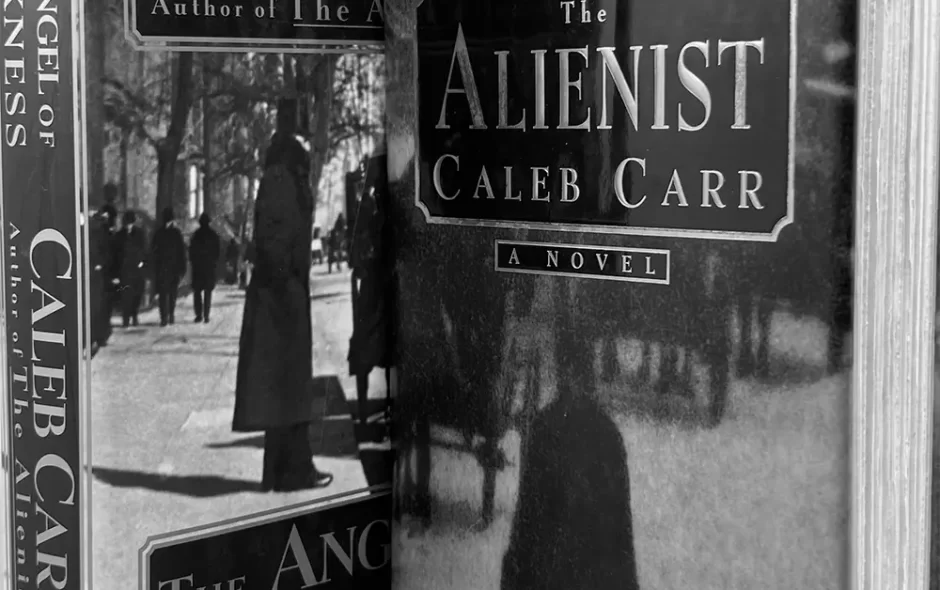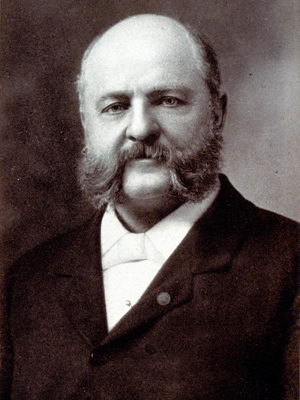As regular 17th Street visitors would be aware, I am (very) slowly completing the supporting character profiles for historical figures that appear in The Alienist. As part of this, I recently completed the profile for the notorious United States Postal Censor, Anthony Comstock. You can now find his character profile below as well as on the supporting characters list.
Comstock, Mr. Anthony
Appears in The Alienist
The fanatical moral reformer Anthony Comstock (1844-1915) only appears in The Alienist on one occasion, but he plays an important role in the novel behind the scenes. Born in Connecticut and raised in a devout Congregationalist home, Comstock served two years in the Union Army before moving to New York City where he married and found work in a dry-goods establishment. Appalled by the city’s rampant vice, Comstock helped to form the New York Society for the Suppression of Vice in 1872. The following year, he came to prominence for convincing legislators that abortion and birth control was as much of a threat to public morality as the “obscene” material (i.e., pornography and indecent literature) targeted by existing legislation. He argued that the consumption of such material resulted from increasing promiscuity among younger generations that was concealed through contraceptive use and abortifacients. Until this point, there had been no federal restrictions on abortion or birth control.
As a result of Comstock’s lobbying, Congress passed An Act for the Suppression of Trade in, and Circulation of, Obscene Literature and Articles of Immoral Use, better known as the Comstock Law, in 1873. The act strengthened existing legislation as well as banning the importation, sale, or distribution of any materials relating to abortion or contraception. Penalties for breaking the law included fines of up to $5,000, or jail and hard labor for a maximum of 10 years. Following the passage of the act, Comstock was appointed as a “special agent” of the United States Postal Service, a role he maintained from 1873 to 1915. During his time as Postal Censor, Comstock’s zealous enforcement of the law resulted in more than 3,600 arrests, and drove at least sixteen people to suicide, including the well-known abortionist Ann Lohman.
Although originally concerned with birth control and abortion, Comstock’s moral crusade had expanded to such a point by the time The Alienist was set in 1896 that he was even attempting to suppress nudity in artwork and medical anatomy textbooks, resulting in indiscriminate raids on art galleries and art schools. By this time, he had also written several books to educate the public about moral dangers in the urban environment.
Click here to read more. Warning: Contains spoilers for The Alienist
We don’t meet Anthony Comstock in The Alienist until John Moore and Dr. Kreizler are taken at gunpoint to the meeting with church officials and former Police Superintendent Thomas Byrnes at the financier J. P. Morgan’s mansion. At this meeting we discover that Comstock has been among those trying to hinder progress in the investigation. While Byrnes’ opposition related to a concern that the team’s methods may threaten his legacy, and church officials feared an uprising of the immigrant population, Comstock’s opposition was rooted in his fear that through becoming “actively involved in civic affairs,” Dr. Kreizler would “spread unrest by discrediting the values of the American family and society.” Specifically, he believed that Dr. Kreizler’s theory of context “speaks against freedom, against responsibility,” and is ultimately “un-American.” In Comstock’s view, the investigation therefore needed to be stopped because if the team were to succeed, Dr. Kreizler’s dangerous ideas “might gain greater credence.” (For more on this, see Part Two of the 17th Street blog about the themes of The Alienist.)
Even though J. P. Morgan is convinced by Dr. Kreizler’s arguments in favour of continuing the investigation, he explains to Kreizler and John that he believes, “Byrnes will continue to harass you, in an effort to preserve the methods and organization he has spent so many years establishing. And he will have Comstock’s support.” True to this prediction, the team continues to be tailed as they go on with the investigation. However, it quickly becomes apparent that although Byrnes and Comstock may have originally been responsible for having the team followed, neither individual may now be calling all the shots. Even John is surprised by an attack they receive while on the road. Kreizler is convinced that Comstock is behind the attack, but John disagrees: “Long-range assassins don’t really seem like Comstock’s style, though.” How much blame can therefore be attributed to Comstock for the events that follow in the novel is unclear.
Sources and further reading: Kenneth T. Jackson (Ed.), “The Encyclopaedia of New York City” (1995), Wilbur R. Miller (Ed.), “The Social History of Crime and Punishment in America: An Encyclopedia” (2012), and Luc Sante, “Low Life: Lures and Snares of Old New York” (1991).




